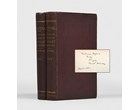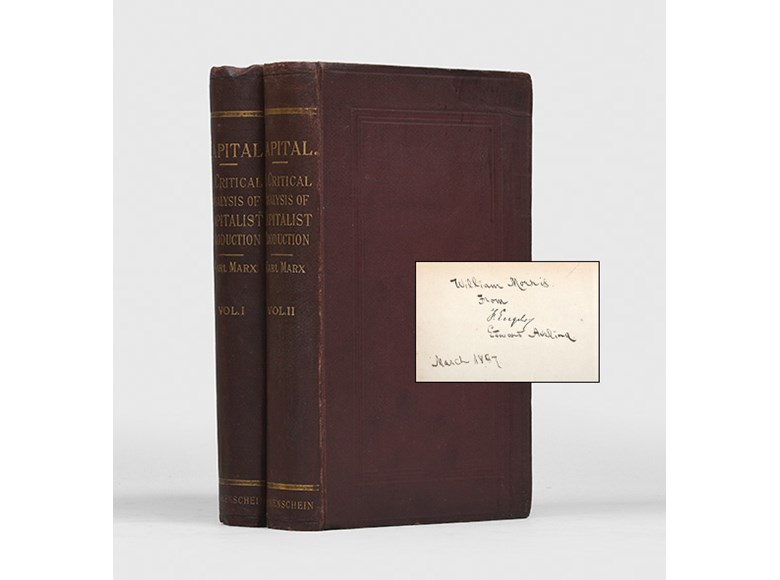 BACK TO GALLERY
BACK TO GALLERY
Peter Harrington
Karl Marx.
Capital: A Critical Analysis of Capitalist Production.
Presentation copy to William Morris by Friedrich Engels and Edward Aveling
description
First edition in English of Das Kapital, presentation copy inscribed in ink on the half-title of the first volume, “William Morris from Edward Aveling March 1887”, with Engels adding his name in his own hand within the inscription. It is, to our knowledge, the only inscribed English Capital to have appeared on the market. This is the first issue, one of 500 copies printed, gifted to Morris in the month that the first edition sold out.
The leading figure in the British Arts and Crafts Movement, William Morris (1834-1896) embraced Marxism in the final two decades of his life. In early 1882 he began reading Das Kapital in the French version, though found it hard going. In January 1883 he joined Henry Mayers Hyndman’s Social Democratic Federation (SDF). Hyndman’s England for All (1881), which plagiarized parts of Das Kapital, was a key text in the formation of English socialism. In December 1884 he seceded from the SDF to found the Socialist League, alongside Eleanor Marx (also a close friend of his daughter May), Edward Aveling, and Belfort Bax. He helped disseminate Marx’s message by arranging and introducing Aveling’s weekly lecture series on Das Kapital, which ran from February to June 1885. The lectures were published concurrently in the Socialist League’s organ, The Commonweal, of which Morris was editor and Aveling sub-editor.
Engels met regularly with the new group, and otherwise kept in touch via Eleanor and Aveling. He approved their decision to split from the SDF but was critical of Morris’s leadership and his anarchist leanings. Despite his reservations Engels continued to contribute to The Commonweal: his piece entitled “How Not to Translate Marx” was published in November 1885.
In January 1887, when the English translation was published, Morris was busy lecturing in London, Norwich, and Merton, and beginning his short-lived Socialist Diary. By March 1887, the date of this presentation, the first edition had almost entirely sold out.
One of T. J. Cobden-Sanderson’s earliest commissions was Morris’s copy of the French edition, which “had been worn to loose sections by his own constant study of it”. That copy sold at Sotheby’s in 1932 (lot 31, £62 to Maggs), and is now in the library of Sir John Paul Getty at Wormsley. It is the only other copy of Marx’s magnum opus, in any iteration, that we can trace in commerce with an association with Morris.
The English translation was begun by Samuel Moore, a lawyer and translator active in the Manchester IWMA and a close friend of both Marx and Engels, at the request of Engels. He was joined in the project by Edward Aveling in 1884, the same year that Aveling began his relationship with Marx’s daughter, Eleanor. Taking as their text the third German edition of book I, Moore and Aveling’s translation incorporated the substantial changes which Marx made for the French translation, published in livraisons between September 1872 and November 1875. Although book II of Das Kapital had been published in 1885, Engels explained the reasoning behind translating just the first book in his preface to the English edition, saying that a translation of it without book III would be incomplete. The German edition of book III did not appear until 1894. English translations of book II and III followed in 1907 and 1909 respectively. All subsequent English editions were based on this “authorized edition”: it remained the standard text for the English-speaking public and continued to be revised and republished until the 1950s.
The leading figure in the British Arts and Crafts Movement, William Morris (1834-1896) embraced Marxism in the final two decades of his life. In early 1882 he began reading Das Kapital in the French version, though found it hard going. In January 1883 he joined Henry Mayers Hyndman’s Social Democratic Federation (SDF). Hyndman’s England for All (1881), which plagiarized parts of Das Kapital, was a key text in the formation of English socialism. In December 1884 he seceded from the SDF to found the Socialist League, alongside Eleanor Marx (also a close friend of his daughter May), Edward Aveling, and Belfort Bax. He helped disseminate Marx’s message by arranging and introducing Aveling’s weekly lecture series on Das Kapital, which ran from February to June 1885. The lectures were published concurrently in the Socialist League’s organ, The Commonweal, of which Morris was editor and Aveling sub-editor.
Engels met regularly with the new group, and otherwise kept in touch via Eleanor and Aveling. He approved their decision to split from the SDF but was critical of Morris’s leadership and his anarchist leanings. Despite his reservations Engels continued to contribute to The Commonweal: his piece entitled “How Not to Translate Marx” was published in November 1885.
In January 1887, when the English translation was published, Morris was busy lecturing in London, Norwich, and Merton, and beginning his short-lived Socialist Diary. By March 1887, the date of this presentation, the first edition had almost entirely sold out.
One of T. J. Cobden-Sanderson’s earliest commissions was Morris’s copy of the French edition, which “had been worn to loose sections by his own constant study of it”. That copy sold at Sotheby’s in 1932 (lot 31, £62 to Maggs), and is now in the library of Sir John Paul Getty at Wormsley. It is the only other copy of Marx’s magnum opus, in any iteration, that we can trace in commerce with an association with Morris.
The English translation was begun by Samuel Moore, a lawyer and translator active in the Manchester IWMA and a close friend of both Marx and Engels, at the request of Engels. He was joined in the project by Edward Aveling in 1884, the same year that Aveling began his relationship with Marx’s daughter, Eleanor. Taking as their text the third German edition of book I, Moore and Aveling’s translation incorporated the substantial changes which Marx made for the French translation, published in livraisons between September 1872 and November 1875. Although book II of Das Kapital had been published in 1885, Engels explained the reasoning behind translating just the first book in his preface to the English edition, saying that a translation of it without book III would be incomplete. The German edition of book III did not appear until 1894. English translations of book II and III followed in 1907 and 1909 respectively. All subsequent English editions were based on this “authorized edition”: it remained the standard text for the English-speaking public and continued to be revised and republished until the 1950s.






 SEND AN EMAIL
SEND AN EMAIL